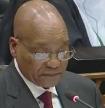Why Zuma thinks a secret ballot is a no go
13 April 2017
Cape Town – There is nothing in the Constitution that suggests a president must be elected or removed by way of a secret ballot, President Jacob Zuma has said.
Responding to a Constitutional Court application by the United Democratic Movement, Zuma questioned involving the court in the motion of no confidence against him, which was initially due to be debated on Tuesday, April 18.
The debate has since been postponed to allow the Constitutional Court process to finish.
"There is no implied or express constitutional requirement for voting by secret ballot for a motion of no confidence. The applicant [UDM] further asserts that the absence of a secret ballot undermines the purpose of the no confidence motion. I deny this is so," the president said in his affidavit.
Responding to the UDM’s assertions that there was no possibility of a motion of no confidence succeeding without a secret ballot, Zuma said the applicant could not resort to judicial intervention where the majority party legitimately exercised its rights and powers.
"As a matter of fact, that is the advantage of enjoying a majority in Parliament and that is how the mandate of the majority is carried out by the majority party," Zuma said.
He said the fact that a motion of no confidence, for example, required the support of the majority to succeed did not mean that it was unconstitutional.
"The applicant in effect requires this honourable court to subvert the rights of the majority party in Parliament, denying the ruling party the benefit of its majority status. This, I submit, is a self-serving interpretation and if permitted would undermine the will of the electorate that elected the party into Parliament and would be unconstitutional," he said.
The president also touched on the separation of powers, telling the court that the National Assembly was responsible for the business of Parliament.
On the party discipline principle, Zuma said the applicant built its case on the notion that that party discipline constituted intimidation and that should be considered by the court in making its determination.
"Members elected on party lists who are allocated to legislative bodies under a system of proportional representation are accountable to their respective parties and Parliament. The party accountable to the electorate," he said.
This obligated members of a party to remain loyal to such party consonant with the expectations of voters who gave their support to the party.
The obligation of loyalty to a party is not inimical to the notion of an accountable, responsive, open and democratic government, he said, and the ANC was not in a different position to this.
"Under normal circumstances, a court would not normally intervene in the internal domestic affairs of a voluntary organisation," Zuma said in his affidavit.
He also raised the issue of urgency, as the motion of no confidence had now been postponed.
"Should the applicant still insist that the application be heard as one of urgency, I reserve the right to contest urgency upon the hearing of this application."
He asked for the application to be dismissed with costs.

